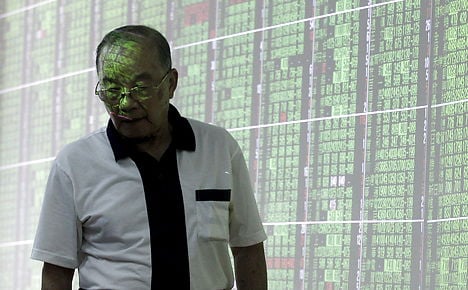FINANCE
Danish stocks plummet as Asia fears spread
UPDATED: The C20 Cap Index ended Monday down 4.7 percent, the biggest single-day fall since 2011, as global traders face "total panic" big drops on the Chinese market.
Published: 24 August 2015 09:43 CEST
Updated: 24 August 2015 20:02 CEST
Updated: 24 August 2015 20:02 CEST

A man walks past a board showing stock market prices inside a brokerage in New Taipei city, Taiwan, August 24, 2015. Taiwan stocks sank by more than 6 percent on Monday morning, following bruising los
The Danish blue chip index C20 ended Monday's trading down 4.7 percent following sharp falls in Asian markets that opened earlier on Monday.
The fall represents the largest single-day decrease on the index since it was established in 2011 just days after the previous single-day record fall was recorded.
All 20 Danish blue chip companies ended Monday in the red, with Danske Bank and A.P. Møller-Mærsk stocks taking the biggest hit. Other major Danish companies including Carlsberg, Pandora, Vestas and Christian Hansen also saw major losses.
Several Chinese indices fell by around eight percent in early trading, while bourses in Hong Kong, Taiwan and Japan were also hit hard. The Tokyo-based Nikkei index fell by 3.21 percent in morning trading to below 19,000 points, its lowest point in the last five months.
“The market has been nervous the past few days and many are fearing a recession in China,” Mads Zink, Danske Bank's head trader, told Ritzau Finans.
TV2's financial commentator Ole Krohn said Monday's trading “appears to be total panic”.
Other European markets took major falls on Monday, including London, where the FTSE plunged 2.8 percent at the start of trading. Germany's DAX stock market index lost 3.24 percent of its value to fall below 10,000 points for the first time since January.
US markets also plummeted on Monday, with the Dow Jones industrial average down by more than 1,000 points to start the day.
The financial unrest in Asia and Europe comes days after Wall Street suffered its biggest one-day loss in almost four years.
On Monday North Sea and US oil prices – a major marker of economic stability – dropped by just over a barrel to around 44 and 39 dollars respectively. The dollar also weakened against both the euro and the Japanese yen.
Market observers have been watching China anxiously for weeks as the country suffers an abrupt slowdown in economic growth.
The latest loss of value comes in spite of massive Chinese government efforts in recent weeks to shore up markets in the country.
Shanghai's stock market has now lost all of the value it had added in the course of 2015.
The C20 drop on Monday followed a 3.23 percent fall on Thursday and a 2.6 percent decrease on Friday.
Url copied to clipboard!


 Please whitelist us to continue reading.
Please whitelist us to continue reading.
Member comments